League of Olympic Swim Legends: Michael Phelps Tops 100 ‘Fly Podium With Spitz & Morales
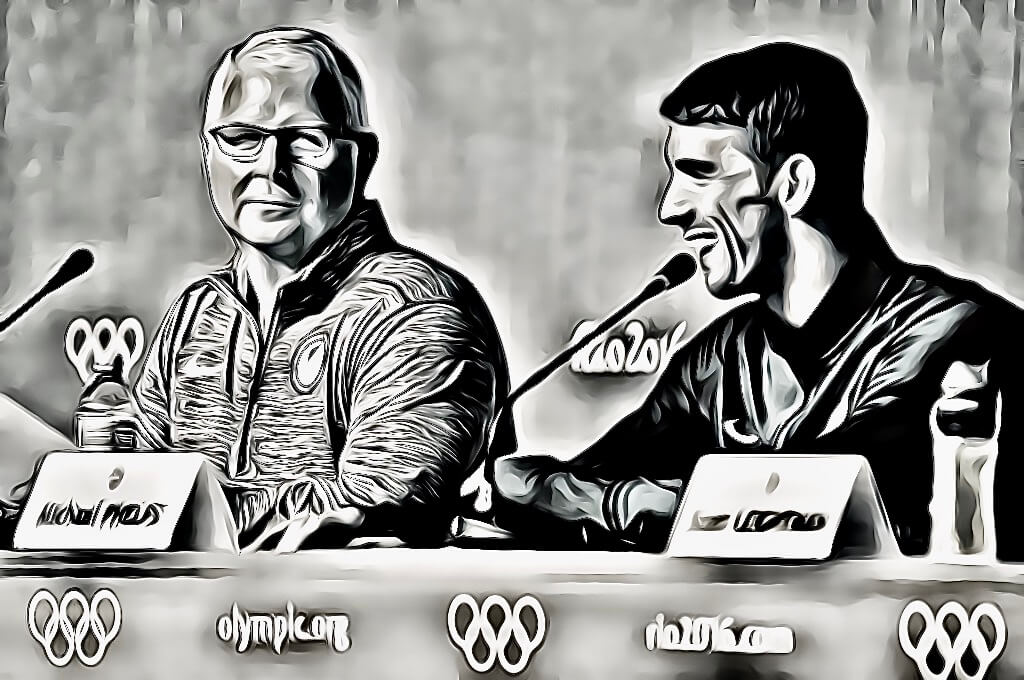
What would have unfolded had Tokyo 2020 gone ahead as planned this week – and where would it all have fit in the thread of Olympic swim legends and pioneers like Michael Phelps, Mark Spitz and Pablo Morales? To mark the eight days over which the Tokyo 2020 Olympic Games would have unfolded had the coronavirus pandemic not forced postponement, the team at Swimming World is filling the void with a Virtual Vision Form Guide and League of Olympic Swimming Legends.
Day 6, event 4 – Legends Gold No4 For the GOAT at the helm of a USA sweep …
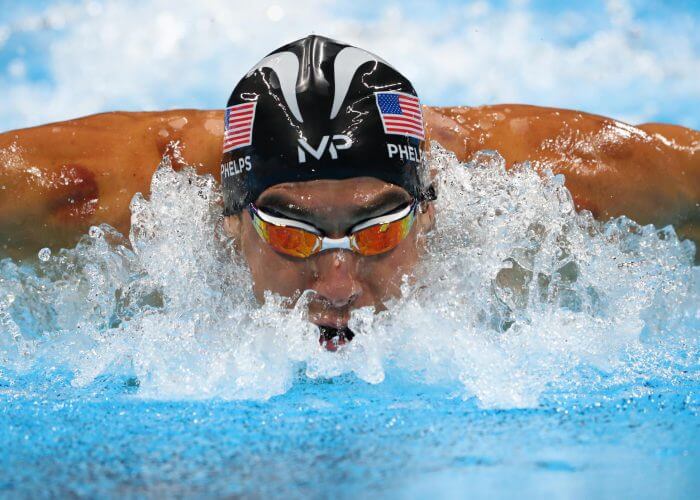
Michael Phelps – Photo Courtesy: Rob Schumacher-USA TODAY Sports
Men’s 200m Butterfly
The Podium
- Michael Phelps (USA)
- Mark Spitz (USA)
- Pablo Morales (USA)
The Other Finalists (Listed Alphabetically):
- Ian Crocker (USA)
- Michael Gross (FRG)
- Chad Le Clos (RSA)
- Anthony Nesty (SUR)
- Denis Pankratov (RUS)
- Our Lane 9* place is a swim off: the unarguable spot goes to a man who at Sydney 2000 won in the fastest time ever to claim the crown to that point, a champion at his third Games, gold his first medal; the second candidate is a nod to the many who loved the pure entertainment of the Phelps-Cavic clashes of 2008 and 2009 (swim-off rule No1: no shiny suits; rule No2 – we’ll let you decide)
- Lars Frölander (SWE); Milorad Cavic (SRB)
* – in our series, we will use Lane 9 to add an athlete whose story reflects extraordinary situations of different kinds, including being deprived by those who fell foul of anti-doping rules or by political decisions or, indeed the Olympic program, as well as simple facts such as “he/she was the only other title winner who claimed gold in a WR but didn’t make out top 8 on points”
All-Time Battle Of Olympic Swim Legends Goes To Michael Phelps

Mark Spitz – bronze at Mexico followed by Munich Gold, as one win among a record seven – Photo Courtesy: ISHOF
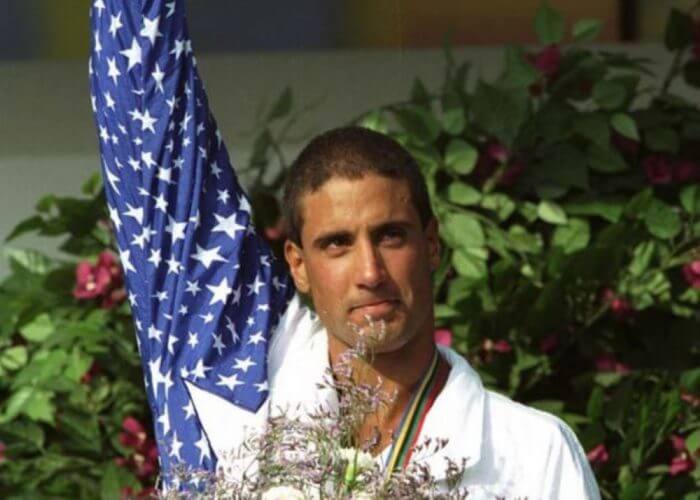
Pablo Morales – Photo Courtesy: AllSport
Is this the most-anticipated event on the program? An argument for that distinction can be made, as the 100 butterfly brings together the two men with the highest single-Games gold-medal hauls in history. In 1972, Mark Spitz stormed to seven gold medals and as many world records. Thirty-six years later, Michael Phelps was one better, winning eight golds while setting seven world records.
On the strength of three Olympic titles and a silver medal, Phelps emerges with the Legends gold. After three-peating in 2004, 2008 and 2012, Phelps shared the silver medal in 2016. His four medals were complemented by three world records and his status as the first man to break th 50-second barrier, his 49.82 performance from 2009 lasting a shade under a decade.
Following a surprise silver medal in 1968, when he was expected to win, Spitz garnered Olympic gold as part of his storied run at the 1972 Games. Spitz established seven world records and became the first man to go sub-56 and sub-55. Further emphasizing his dominance is the fact that Spitz held the world record from 1967-77.
The bronze medal went to feel-good story Pablo Morales, who was the 1984 silver medalist. Expected to return to the Games in 1988, Morales was shockingly unable to advance beyond the United States Trials. After a brief retirement, Morales returned and qualified for the 1992 Olympics in Barcelona, where he claimed gold in the 100 fly. Morales was a two-time world-record setter, the second standard lasting nine years.
Michael Phelps – His Middle Win, 2008 – The 0.01sec At The Heart Of Controversy
When The Midas Touch Began – Michael Phelps Vs Ian Crocker, 2004
Ian Crocker, with Michael Phelps in the background
2004 Athens – Men 100m Butterfly – Athletes: 59 Nations: 51
- 51.25or Michael Phelps USA
- 51.29 Ian Crocker USA
- 51.36er Andriy Serdinov UKR
52.27 Thomas Rupprath GER
52.32 Igor Marchenko RUS
52.34 Gabriel Mangabeira BRA
52.46 Duje Draganja CRO
52.56 Geoff Huegill AUS
Date of final: August 20, 2004
At the 2000 Olympic Games, Ian Crocker just missed a medal in the 100m butterfly. A year later, at 19, he claimed silver at the World Championships behind Olympic champion Lars Frölander. Two years later still, he bided his time in semi-finals for the world 100m butterfly title as Andriy Serdinov and Michael Phelps traded world records of 51.76 and 51.47 respectively. In the final, Crocker beat them both to become the first man to race inside 51sec, on 50.98. At US Olympic trials in 2004, Crocker lowered the mark to 50.76.
In Athens, Phelps edged Crocker 51.61 to 51.83 in semis. By the time the 100 ‘fly finalists took to their blocks for the showdown, the 19-year-old in lane 4 had already claimed four gold medals and a bronze behind Ian Thorpe (AUS) and Pieter van den Hoogeband (NED) in the ‘Race of the Century’ 200m freestyle.
Crocker stood in the way of gold medals numbers 5 and 6, the 100m butterfly important to a berth in the medley relay. After blasting from the blocks into an early lead, Crocker turned in 23.59, 0.3sec up on world-record pace. Back in fifth, Phelps turned in 24.39 and had work to do. Off the turn, he soon started to pick off his rivals one by one. But Crocker was not about to be rolled over.
Even in the last metre, it looked as though the World champion and record holder had done enough but Phelps, travelling faster by then, swept into the wall and whipped his hands home with the ferocity and skill of an orca going in for the kill. The title went to Phelps in an Olympic record of 51.25, just 0.04sec ahead of his teammate. In what was then the second-closest 100m butterfly podium in history (after Pablo Morales won by 0.03sec in 1992), Serdinov claimed bronze in 51.36.
The closest battle in history would unfold four years on, When Phelps mirrored the flow of the 2004 fight in a battle with Milorad Cavic (see video above).
There was never any mercy for Cavic from Phelps: Winner takes all. It was not quite the case with the American’s teammate at Athens 2004: Phelps took the decision to relinquish his right to a place in the final four for the medley relay so that Crocker could race for the gold medal. The gesture provided a boost to the entire USA team but Phelps did not go without: he raced in the heats of the relay and therefore claimed a token sixth gold medal in one Games, leaving him one shy of the record seven won by Mark Spitz (USA) in 1972.
All fuel for Beijing 2008…
Back in 1972, the Olympic final had nothing of the tightness of Phelps’ 100m finals. Dominance was the order of the day:
When Mark Spitz Took The Pace Of 1972 ‘Fly Up To The Speed Of The 1961 100 Free WR
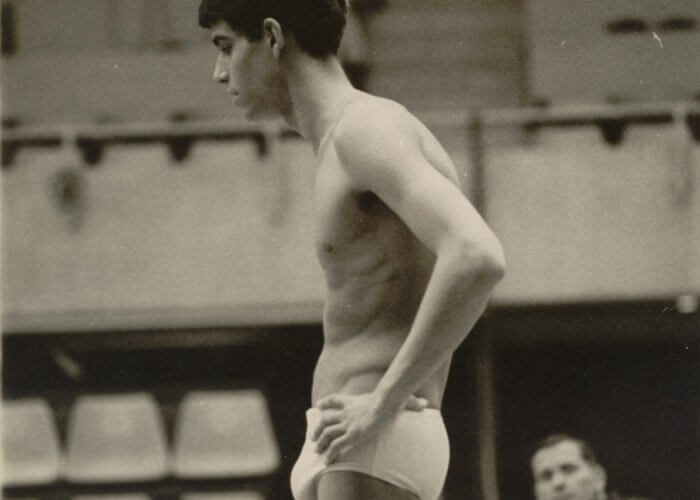
Mark Spitz – 1968 – with a journey to maturity ahead – Photo Courtesy: Swimming World Archive
1972 Munich – Men 100m Butterfly – Athletes: 39 Nations: 26
- 54.27wr Mark Spitz USA
- 55.56 Bruce Robertson CAN
- 55.74 Jerry Heidenreich USA
55.87 Roland Matthes GDR
56.11 David Edgar USA
57.27 Bryon MacDonald CAN
57.40 Hartmut Floeckner GDR
57.90 Neil Rogers AUS
Date of final: August 31, 1972
The timespan between Jim Montgomery‘s famous 49.99 (Montreal 1976) on 100m freestyle and the first sub-50sec 100 ‘fly (Michael Phelps, Rome 2009 with the spray of shiny suit) is 33 years. That’s how long it took for one stroke to catch up with the pioneering pace of the other.
Imagine then the strength of Mark Spitz and his 54.27sec World record for gold at Munich 1972: the time would have set a global mark over 100m freestyle just 11 years earlier.
With that victory in the 100m ‘fly, Spitz continued to roll towards special sporting immortality with his fourth gold medal at Munich 1972. By the time he arrived in Munich, Spitz had set the world record in the 100m butterfly six times, the only interruption in his run of global standards the record which was equalled by Doug Russell (USA) in 1967 on his way to keeping Spitz at bay in the 1968 Olympic final.
By 1972, Spitz’s dominance on butterfly was no longer in question. At US trials in Chicago he left the world record at 54.56 and in the second semi-final in Munich equalled Russell’s Olympic record of 55.9 with a 55.98 at the first Games to record times to the hundredth (and in one case a thousandth, see 400m medley men, 1972) of a second.
In the final, Spitz left nothing to chance, turning in 25.38, with teammates Dave Edgar and Jerry Heidenreich respectively within half a stroke and a stroke and Roland Matthes, the greatest backstroke swimmer the world had known and still the king of all-time results, precisely a second down on Spitz. Out of the turn, Spitz maintained a pace that his rivals could not cope with. Steadily but decisively, the American increased his lead and claimed the crown in 54.27.
Each of his four gold medals to that point had been won in World-record time.
The race for the minor medals was thrilling, with four men stopping the clock within half a second of each other. Bruce Robertson came back hard to take the silver from Heidenreich, locking Matthes out of the medals by 0.13sec, with Edgar back in fifth. Matthes was one of two finalists inn 1972 who would race in the final eight four years on at Montreal 1976. The other was Neil Rogers, who finished eighth in both 1972 and 1976.
Spitz’s world record survived the 1976 Games before being broken in 1977 by Joe Bottom (USA).
The Seven Golds of Mark Spitz – 1972:
Perseverance Pays Off For Pablo Morales
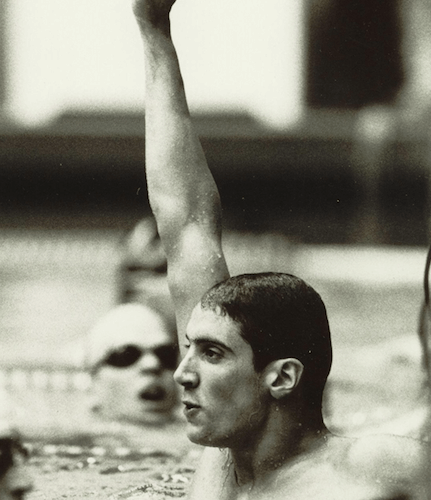
Pablo Morales – Photo Courtesy: Tim Morse
1992 Barcelona – Men 100m Butterfly – Athletes: 69 Nations: 48
1 USA 53.32 Pablo Morales
2 POL 53.35 Rafal Szukala
3 SUR 53.41 Anthony Nesty
4 UKR 53.81 Pavlo Khnykin
5 USA 54.04 Melvin Stewart
6 CAN 54.18 Marcel Gery
7 ESP 54.19 Martin Lopez-Zubero
8 RUS 54.26 Vladislav Kulikov
Date of final: July 27, 1992
The offspring of Cuban immigrants, Pablo Morales, of Chicago, Illinois, showed early promise when at 15 he broke Mark Spitz’s 16-year-old 100yd high school butterfly record.
At 19, he broke the first of his two individual world records (53.38 for 100m butterfly) at the US Olympic trials. At the 1984 Games, he clocked 53.23 but Michael Gross took gold in 53.08. Morales claimed a shared gold in the world record breaking USA medley relay (3:39.30), while a silver in the 200m medley completed a fine Olympic debut.
When coached at Santa Clara by Mitch Ivey* (dammed for life, 2013), Morales took Gross’s world mark down to 52.84 on June 23, 1986 at Orlando but at the 1988 US Olympic trials he finished third in both butterfly events. Morales was so distraught that he could not bring himself to watch the 1988 Games on the television. He quit swimming and entered law school. In January, 1991, Morales was living another life when Anthony Nesty, the 1988 Olympic champion, became the first black swimmer to win a world title.
However, the death of Morales’s mother, Blanca, from cancer, prompted the retired world record holder to make a comeback in late 1991. In March 1992, he won the US Olympic trials and the dream was alive once more. This time, however, he would not be held up as favourite until after the heats. Nesty had the best time in the world that year, at 53.81.
In the heats in Barcelona, Morales, 27, turned heads when he swam the fastest time, of 53.59, 0.01sec up on Rafal Szukala (POL). The final turned into a battle between those two and the defending champion, Nesty. Morales had a poor start but was ahead by the turn, on 24.76, to the 25.06 and 25.32 of Unified Team members Pavel Khnykin and Vladislav Kulikov, with Nesty fourth on 25.33 and Szukala fifth in 25.44.
Nesty and Szukala made their move at 65m, clawing back the deficit to Morales with every passing stroke. In the closing five metres Morales started to struggle but his rivals had left it too late. The dream comeback had come to pass: Morales took gold in 53.32, 0.03sec ahead of Szukala, with Nesty 0.09sec shy of retaining his crown. It was the tightest 100m butterfly podium in history. Morales emerged to hug his partner in study and USA teammate, Jeff Rouse, and their coach Skip Kenney.
At 27, Morales had become the oldest winner of the butterfly sprint. He later became head coach to the San Jose State University women’s swim team in California. After his medal ceremony, Morales dedicated his triumph to Blanca, telling the media:
“When I was up on the victory stand, I was thinking that my mother would want to be here to experience this – and I know that she was with me in spirit. This was my time at last”.



